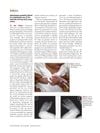Dermatological medications and local therapeutics
January 2015
in “Elsevier eBooks”

TLDR Use some skin medications with caution during pregnancy; avoid strong steroids, certain eczema treatments, and systemic retinoids, but many topical treatments and nasal sprays are safe.
The document from 2015 provides guidelines on the use of dermatological medications and local therapeutics during pregnancy, emphasizing the importance of caution due to potential risks to fetal development. It states that while some treatments like coal tar preparations, tacrolimus, and certain antiseptics, astringents, antipruritics, and essential oils are considered safe for topical use during pregnancy, others such as very potent glucocorticoids, pimecrolimus, dithranol, and systemic retinoids are to be avoided due to their teratogenic effects. Topical retinoids, although not confirmed teratogenic in controlled studies, should be used with strict pregnancy prevention programs. UV light treatments are generally safe, but oral photochemotherapy with psoralens is not recommended. For lice and scabies, non-chemical treatments are preferred, and permethrin is the treatment of choice for scabies. Minoxidil and finasteride are contraindicated for hair loss during pregnancy. DEET should be used cautiously as a repellent, and cosmetics are safe if lead-free. Glaucoma therapy is acceptable, but prostaglandins should be reserved. Nasal decongestants have not shown risk, but lack systematic embryotoxicity studies. Other preparations like glucocorticoids, cromoglicic acid, antihistamines, antibiotics, and acyclovir are considered safe. A study with 26 women showed no developmental differences in newborns when using fluticasone nasal spray. Hemorrhoid medications and vaginal therapeutics are generally safe, but the use of outdated medications with controversial effectiveness is discouraged.
View this study on sciencedirect.com →
Cited in this study

research Adverse effects of isotretinoin: A retrospective review of 1743 patients started on isotretinoin
Most people on isotretinoin had chapped lips, but only a few stopped the medicine due to side effects.

research Aphalangia possibly linked to unintended use of finasteride during early pregnancy
Finasteride use during early pregnancy may cause limb deformities in babies.

research Topically applied minoxidil may cause fetal malformation: A case report
Minoxidil use during pregnancy may cause fetal harm.

research Safety of Topical Minoxidil Solution: A One-Year, Prospective, Observational Study
Minoxidil solution safely and effectively treats hair loss.
Related

research Isotretinoin-Unresponsive Acne as a Sign of a Congenital Disorder: A Case of 21-Hydroxylase Deficiency
Acne not improved by usual treatments may indicate a genetic disorder.